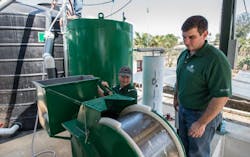Anaergia Upgrading Biowaste Digester on Michigan State Campus
Renewable energy firm Anaergia, through its subsidiary Anaergia Technologies, has entered into agreements to upgrade the South Campus Anaerobic Digester (SCAD) at Michigan State University (MSU) in East Lansing, Michigan.
The SCAD facility, located at the South Campus Anaerobic Digester and Compost Facility, is said to be one of the largest anaerobic digesters operating on a university campus in the U.S.
The upgrade is part of a larger initiative connected to MSU’s ongoing construction of a new Dairy Cattle Teaching and Research Center, which began in April and is expected to be completed by 2026. The facility will house 680 dairy cows, requiring the SCAD to be upgraded to handle the additional animal waste.
Phase 1 of the project, already completed by Anaergia, involved replacing key components of the plug flow digester. The company is now providing technology for Phase 2, which focuses on upgrading the complete-mix digester tank.
The SCAD facility plays a crucial role in managing manure at the university, eliminating the need for open-air storage and significantly reducing odors and methane emissions typically associated with land-applied liquid manure. The facility, which also processes food waste from campus dining halls and local food processing waste, uses Anaergia’s Omnivore anaerobic digestion system. Installed in 2014, the system generates 380 kW of electricity, which powers several MSU buildings.
"MSU’s anaerobic digestion facility reflects the University’s dedication to developing programs and projects to research the use of organic residues and wastewater and create win-win-win solutions for rural communities, renewable energy production, and the environment,” said Wei Liao, Professor and Director Anaerobic Digestion Research and Education Center, at MSU.
